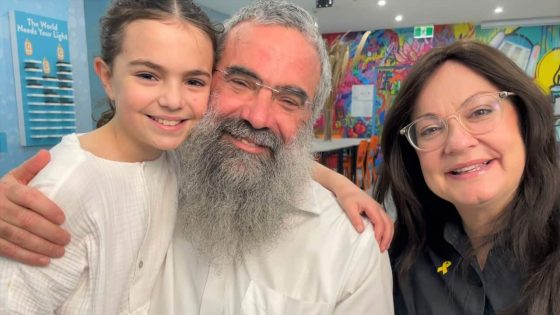“We try to produce as much food as we can. At the moment, we are producing around about 5,500 meals every week.”
OBK manager George Karounis preparing meals with volunteers. Source: SBS / Sandra Fulloon
The venue is Our Big Kitchen, or OBK.
“The cost of living pressure is real. We are not just feeding people sleeping rough, or in shelters or sleeping in cars. We have people knocking on the doors now.

Meals being prepared by volunteers at OBK. Source: SBS / Sandra Fulloon
“We also support larger charity groups that are feeding more people who are behind in their mortgage payments, struggling with the cost of living pressures or behind [in] paying rent.”

Fresh bread is among the foods produced at OBK daily. Source: SBS / Sandra Fulloon
“We are doing field research at the moment and I expect not only will that number have increased, but we are also seeing a really significant shift in the severity that people are facing.
The Salvation Army feeds many of those in need. Two afternoons a week, the van collects 140 hot meals from OBK for immediate delivery.

Salvation Army coordinator Danny says the need for food relief among the community is “getting greater and greater”. Source: SBS
“Getting a hot meal on a cold night means a lot,” says Danny, a Salvation Army community outreach coordinator.
“And the need is getting greater and greater. Money is tight for many families, and we are seeing a lot more people on the street. They may not be sleeping rough, they are just doing it tough.”
Slavin says he learned to value food after hearing about his father’s incarceration in a Russian prison.

Dovid Slavin as a child with his mother Miriam (left) and father Tzvi (right). Source: Supplied / Rabbi Dovid Slavin
“Dad was born and raised in Russia and then he ended up in the gulags,” he says.
“So, I grew up in a home where throwing out food simply did not happen.”

Dovid Slavin (centre) with his father Tzvi (left), his mother Miriam (centre-right) and his late sister Tzivia Zaklos. Source: Supplied / Rabbi Dr Dovid Slavin.
Slavin grew up in New York City in the United States and migrated in the early 1990s to marry Laya. Since then, the couple has devoted their lives to feeding others.
“My mother’s family grabbed the chance and went to the Russian side. But they didn’t accept Russian citizenship, which sent them to Siberia.

Slavin (left) with his mother Miriam (centre) at the wedding of his late sister Tzivia Zaklos. Source: Supplied / Rabbi Dr Dovid Slavin
“It was very tough, and one of the things my mum has never quite gotten over is the loss of a two-and-a-half-year-old brother from starvation. He kept asking for a bit of bread.
“I cannot begin to tell you the difference these meals made to women who were in hospital, they were magic,” she says.

Laya Slavin at OBK. Source: SBS / Spencer Austad
“I am still in touch with many of the women today. And those meals were a lifeline, using our kitchen.”
“In a country like Australia, which is blessed with incredible abundance, there is so much perfectly edible food being thrown out while, at the same time, people are going hungry.”

Food preparation at OBK. Source: SBS / Sandra Fulloon
Foodbank Australia supports that view.
OBK is among the organisations trying to correct that, making meals with food donated by supermarkets and charities.

Volunteers working at the OBK kitchen. Source: SBS / Sandra Fulloon
The non-denominational food service is also staffed mainly by volunteers, although some, like manager George Karounis, stay on as full-time workers.
“At this moment we are coping. But I think if demand increases to 6,500 or 7,000 meals a week, then the service will struggle.”

Slavin (centre-left) with his wife Laya and other family members. Source: SBS / Spencer Austad
Slavin and Laya are parents to eight children and are proud to source helping hands for OBK from the wider community. He says without it, OBK would struggle to meet rising demand.
Michael Manton, principal of St Charles Catholic School in Waverley, was among dozens giving their time this week.

School principal Michael Manton is among those who have volunteered their time to help out at OBK. Source: SBS / Spencer Austad
“We are aware of families within our community that do need support,” he says. “Getting three meals a day is important for growing families.
“So, obviously we were keen to make a difference for at least one or two of those meals today.”
“But we say to people, once we’ve done that, let’s try to do something a bit more meaningful. Come and volunteer at OBK. We make it fun as a team-building exercise.”
“And we’re working on ways to share policies and procedures with other charities who approach us.”

Rabbi Dovid Slavin at OBK. Source: SBS / Spencer Austad
Sharing is the core message behind OBK. As Slavin says, at a time of growing global conflict, uniting diverse communities is crucial.
“And we have been very successful in being able to bring people from very, very different backgrounds in together and to [help them] realise that while we may speak different languages, or we may look a bit different, ultimately we are one and the same.”
Source Agencies



